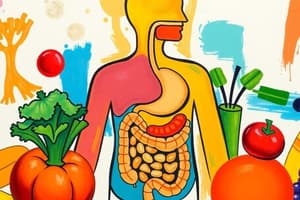Podcast
Questions and Answers
Where does the digestive process start?
Where does the digestive process start?
- Mouth (correct)
- Stomach
- Small intestine
- Pancreas
Which organ secretes hydrochloric acid and pepsin to further break down proteins?
Which organ secretes hydrochloric acid and pepsin to further break down proteins?
- Pancreas
- Stomach (correct)
- Small intestine
- Mouth
Where are the nutrients absorbed by the small intestine's villi and microvilli?
Where are the nutrients absorbed by the small intestine's villi and microvilli?
- Stomach
- Small intestine (correct)
- Pancreas
- Mouth
Which organ secretes digestive enzymes and bicarbonates to neutralize the acidic chyme entering the small intestine?
Which organ secretes digestive enzymes and bicarbonates to neutralize the acidic chyme entering the small intestine?
What plays a critical role in ensuring we obtain the necessary elements for survival, growth, and repair?
What plays a critical role in ensuring we obtain the necessary elements for survival, growth, and repair?
What is the primary role of the gallbladder?
What is the primary role of the gallbladder?
Which nutrient is broken down into glucose by enzymes like amylase during digestion?
Which nutrient is broken down into glucose by enzymes like amylase during digestion?
What is the main function of fats in the body?
What is the main function of fats in the body?
Why is a balanced diet crucial for maintaining good health?
Why is a balanced diet crucial for maintaining good health?
What is the essential role of the large intestine in digestion?
What is the essential role of the large intestine in digestion?
Flashcards are hidden until you start studying
Study Notes
Title: Decoding Nutrition: Exploring the Digestive System in Human Beings
As a crucial aspect of our overall health and wellbeing, nutrition is an essential component of the human experience. In this article, we'll delve into the importance of nutrition in our lives, particularly focusing on the key subtopic of the digestive system.
The Digestive System: Our Body's Food Processing Plant
The digestive system is a complex network of organs and structures that work together to break down, absorb, and distribute nutrients from food. It's our body's food processing plant, which plays a critical role in ensuring we obtain the necessary elements for survival, growth, and repair.
Our digestive system starts in the mouth, where enzymes contained within saliva begin breaking down carbohydrates and proteins. From there, we'll explore some of the key organs and structures involved in the digestive process:
-
Stomach: This muscular organ secretes hydrochloric acid and pepsin to further break down proteins and create an acidic environment allowing enzymes to function.
-
Small intestine: Here, the nutrients are absorbed by the small intestine lining's villi and microvilli. This area is rich in enzymes that break down fats, proteins, and carbohydrates.
-
Pancreas: The pancreas secretes digestive enzymes and bicarbonates to neutralize the acidic chyme entering the small intestine.
-
Liver and gallbladder: The liver produces bile, an essential emulsifying agent that helps fats break down into smaller droplets, allowing them to be more easily absorbed by the small intestine. The gallbladder stores and releases bile as needed.
-
Large intestine: The large intestine absorbs water and electrolytes from the remaining indigestible food matter, forming feces, which is then expelled from the body.
Nutrients: The Building Blocks of Life
Nutrients are essential molecules required for the body to function at an optimal level. These nutrients can be classified into the following categories:
-
Carbohydrates: These are our primary energy source and are broken down into glucose by enzymes like amylase during digestion.
-
Proteins: Proteins are made up of amino acids, which are vital components for growth, repair, and maintenance of body tissues.
-
Fats: Fats are a rich source of energy and are essential for the absorption of fat-soluble vitamins like A, D, E, and K.
-
Vitamins: These organic compounds are required in minute amounts to support various metabolic functions.
-
Minerals: Essential for the proper functioning of enzymes and muscles, these elements include calcium, iron, and potassium.
Balanced Nutrition: The Key to Good Health
A balanced diet plays a crucial role in maintaining good health. It should provide an adequate supply of nutrients in the right quantities and at the right times. For example, eating a variety of fruits and vegetables can help us obtain essential vitamins and minerals, while whole grains supply our bodies with complex carbohydrates.
In conclusion, understanding the digestive system and its role in nutrition is essential for maintaining good health. By consuming a balanced and nutritious diet, we can support our digestive system's function, ensuring that our bodies have the fuel they need to thrive. Armed with this knowledge, we can make healthier dietary choices, paving the way to a happier and healthier life.
Studying That Suits You
Use AI to generate personalized quizzes and flashcards to suit your learning preferences.





